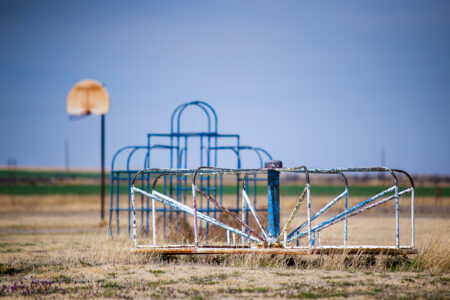Share On Social!
Many Latino kids live in “recreation deserts,” which lack access to safe, affordable physical activity opportunities. Therefore, they often do not meet daily physical activity recommendations and are at increased risk for obesity. One way to reduce these barriers and increase physical activity among Latino children is to provide free, safe recreation facilities in their neighborhood with culturally relevant programming. Two community-driven initiatives in Multnomah County, Ore., have crossed paths in their efforts to reduce recreation deserts in disadvantaged neighborhoods by building and fixing soccer fields and futsal courts.
Soccer Loving Kids Live in Recreation Desert
Oregon residents Shawn Levy and Ricki Ruiz love soccer and know it is good for kids and adults.
But each found that soccer, and physical activity in general, wasn’t always accessible.
For example, the Portland, Ore. neighborhood of Portsmouth (10% Latino) has fewer than 10 recreational facilities per 100,000 people, compared to over 50 per 100,000 in a nearby neighborhood tract. Levy said this area is the most racially/ethnically diverse census tract in the state, with residents from 22 different countries. Additionally, it has a larger proportion of younger residents, children living in poverty, and children on school meal assistance.
Similarly, Ruiz’s neighborhood of Rockwood (28.8% Latino), in Gresham, Ore., has fewer than 10 recreational facilities per 100,000 people, compared to over 50 in a nearby neighborhood. Although Rockwood is home to Vance Park, a large portion of it has been fenced off for over a decade to prevent kids from accessing an abandoned skating rink, but kids climb the fence anyway to play soccer. Ruiz said he and other kids would use their sweatshirts or backpacks as goal posts until they got chased away by police.
When low-income, racial/ethnic minority neighborhoods lack recreational facilities, children don’t participate in recommended levels of physical activity and these kids have a higher risk of obesity, which tends to lead to adult obesity. Additionally, neighborhoods with abandoned facilities are burdened by more crime, drugs and homelessness.
Soccer has many health benefits, including fewer head injuries and significantly more time play time than football (68 minutes per game compared to 11 minutes per game).
There are social benefits, too, as the sport unites diverse groups of people, Ruiz said.
“It doesn’t matter if you are playing in grass or playing in a parking lot, you will see all sorts of diverse people playing soccer,” he said.
Soccer players are estimated to exceed 250 million people in over 200 countries and soccer fans are estimated to exceed 3 billion people worldwide.
The sport has cultural popularity among Latinos, as Latino countries Brazil, Argentina, and Uruguay are among the most historically successful FIFA World Cup soccer teams (Table 1).
| Table 1. FIFA World Cup Top 5 Teams Reaching the Top Four and the United States | ||||
| Team | Titles | Runners-up | Third | Fourth |
| Brazil | 5 (1958,1962, 1970, 1994, 2002) | 2 (1950, 1998) | 2 (1938, 1978) | 2 (1974, 2014) |
| Germany | 4 (1954, 1974, 1990, 2014) | 4 (1996, 1982, 1986, 2002) | 4 (1934, 1970, 2006, 2010) | 1 (1958) |
| Italy | 4 (1934, 1938, 1982, 2006) | 2 (1970, 1994) | 1 (1990) | 1 (1978) |
| Argentina | 2 (1978, 1986) | 3 (1930, 1990, 2014) | ||
| Uruguay | 2 (1930, 1950) | 3 (1954, 1970, 2010) | ||
| United States | 1 (1930) | |||
Unfortunately, in the United States, Latinos miss out on soccer because soccer fields tend to be limited to middle-class suburban neighborhoods and soccer clubs can be expensive, experts say.
“Club soccer dominates in the U.S., and this is an expensive and almost impossible barrier for Latinos due to the costs and suburban nature of the programs,” race/ethnicity researcher Brandon Valeriano told the Washington Post. “Moving up a level, participation in high school or college teams assumes the participant has the freedom to actually play sports after school, an option not many of us had as working became a priority once we were of legal age.”
Soccer is big-time in Portland, even with the disparities in field access.
There’s a 12,000-person waiting list for season passes to the Portland Timbers professional soccer team, said Mike Golub, president of business operations for the Timbers team.
In the mid-2000s, the Timbers Army, the Timbers’ team large fan organization, was a major catalyst in organizing a campaign to get the city of Portland to secure a Major League Soccer team designation.
During this time, four Timbers Army members, Levy being one, started to explore how they could capitalize on the MLS designation to do some good for the community.
“If we could bottle all the things that are Timbers Army and put that bottle on a shelf so that we could use it for some good, what would that be?” Levy asked.
They thought: Find a way to build new soccer fields and fix existing ones in local “recreation deserts.”
“This isn’t about the Timbers Army, this is about the kids” and increasing access to physical activity in neighborhoods like Portsmouth and Rockwood, Levy said.
Fan Club Starts Nonprofit
The four Timbers Army fan club members decided to join forces and start a nonprofit that could improve recreational options in underserved areas.
The four fans had no public health or nonprofit experience but were community volunteers with unique skills.
“One is field general, organizer of troops, I’m the media guy, another guy is in marketing and community relations and then we have this attorney,” Levy said.
Together they started a nonprofit, Operation Pitch Invasion (OPI), as strictly charitable endeavor that would be able to partner with the Portland Timbers and the Timbers Army fan organization to reduce local recreation deserts.
The OPI started off wanting to do three main things: (1) organize volunteer projects to restore soccer fields; (2) build new soccer fields; and (3) use donated land near schools and parks to make futsal courts in underserved areas.
Futsal is basically mini-soccer for youth. It is played with 5 players per side, rather than 11, and is played on a basketball-sized court.
Abandoned Roller Rink
Ricki Ruiz also wanted to bring futsal courts to his Rockwood neighborhood.

He and Yesenia Delgado created a community group, Rockwood Initiative, to address health issues in their Gresham neighborhood of Rockwood. They weren’t the first to identify the abandoned roller rink in Rockwood’s Vance Park as a recreation desert; however, they were the first to rally the community and reach out to stakeholders to address it.
The four OPI board members, Shawn Levy, Josh Barrett, Fernando Machicado and Tye Ortega, were ready to motivate fans to participate in reducing recreation deserts.
“These parks are Portland. We are soccer fans, our kids play soccer, we play soccer, and we used to play soccer. Fixing these parks up should be your pride,” Levy said. Timbers Army fans spend 90 minutes singing in the bleachers every game. They can spare 3 hours on one Saturday a year.”
Similarly, Rockwood Initiative was ready to motivate community members to participate in efforts to reduce recreation deserts.
Soccer Fan Love to Help Their Community
OPI began rallying support for activities to reduce local recreation deserts.
A big part of the support system is the Portland Timbers team and the Timbers Army fan organization.
The team, one of the 10 most philanthropic companies in Oregon for the past few years, always seeks ways to give back to the community, Golub said.
“We are a sports team and we have a unique platform and we should use that platform responsibly for the betterment of the community,” he said.
Levy said the team’s support is huge for OPI.
“Aside from the money that a club can drop into something like this and the sponsors that they bring along,” he said, “they have such a visible presence in the community and such a loud megaphone when they say something.”
Levy said Timbers Army fans also are always motivated to help, because they live in work in these communities and know what the issues are.
“We aren’t strangers when we coming knocking. We are never turned away. We are never left empty handed,” Levy said.
Because Ruiz and Yesenia were community members, Rockwood Initiative was not turned away either. Within a month of creating Rockwood Initiative, they began going out into the community to give presentations and gain stakeholder support. The city and the county were high on their list of stakeholders.
“Once you have two government departments on your side, it’s serious,” Ruiz said.

Restoring Soccer Fields
OPI’s first initiative was to organize volunteer projects to restore soccer fields. They gathered volunteers and supplies to move dirt, fix goals, repaint lines and fix sprinkler heads in parks, fields and schools.
“That cost us donuts, coffee and water, but we always wanted to do bigger things,” Levy said.
While OPI was scheduling multiple community volunteer projects, they were also garnering support from bigger organizations in order to implement their second initiative: build new soccer fields.
The land to build their first new soccer field, Bless Field, in the underserved Portsmouth neighborhood was donated by the city housing authority. “OPI couldn’t have afforded a city block,” Levy said.
OPI then raised $200,000 in funds (e.g., $50,000 from Timbers Army, $40,000 from the Portland Development Commission, $35,000 from Timbers). Work on Bless Field began in 2012 and they cut the ribbon in 2014.

OPI learned a lot about organizing projects and partnerships from Bless Field.
“We just plain learned. It was our first big project. We made mistakes, we waited until we had all the money to apply for permits not knowing that permits were going to take so long,” Levy said. “Fortunately we had good political connections from when they lobbied the city to give us the soccer stadium. So we learned that, now we put in for permits earlier.”
And Futsal Courts
Their leftover funds for Bless Field led OPI to its third initiative—turning an abandoned tennis and basketball courts into futsal courts.
“In Latin America, Europe, Africa, kids are playing with a ball at their foot all the time. A 6-year-old doesn’t need a 100 yard by 60 yard field. They just need a designated space where they can have a ball at their foot,” Levy said.
Levy heard of an abandoned tennis court wasting away in an underserved neighborhood.
He went to the Portland Parks and Recreation Department (PP&R) to see if there were other courts like it.
PP&R had a list of 26 tennis and basketball courts they were unable to maintain—and due to disrepair and discord, the courts were being used for off-leash dogs and other unsavory activities—and thus were willing to donate them to OPI. By sharing the responsibility, donating the courts, and changing the use, PP&R assisted in ridding discord from the community and providing a new opportunity to be healthy.
OPI looked the courts up on Google Maps and started to focus on the ones located in needy areas.
These three initiatives led to OPI’s biggest change yet, which opened a major door for Rockwood Initiative.

In June 2014, OPI launched a partnership with the Portland Timbers team community program, called “Stand Together,” to create “Fields for All.”
“Fields for All” is a field-building collaboration, with the goal of completing one large field project in a disadvantaged neighborhood every two years.
“Fields for All” immediately put out a call for community projects proposals. Proposals must demonstrate the need for a field, how the field is going to be used, how the field is going to be maintained, how the field is going to be administered, what groups they are going to be serving.
The Rockwood Initiative had gained residents, city, county, and other support to develop and submit a “Fields for All” proposal for Gresham’s Rockwood neighborhood, which would remove the abandoned skating rink in and fencing and build two futsal courts in its place, called Snake Field (named to reflect the community’s interests: SNAKE – Sports, Neighborhood, Action, Knowledge, and Empowerment).
OPI and the Timbers reviewed all proposals and, in March 2015, chose Snake Field as its first project.
Roller Rink Transformed into Futsal Court
Construction on Snake Court launched in April 2015.
The ribbon cutting and dedication of the new futsal courts, named Snake Court, is scheduled for Sept. 22 2015.

OPI’s decision to select field renovations and locate new field sites in minority and low-income communities helps to build equity in the availability of recreation sites for children, Levy said.
For example, Latino kids will have safer places to be physically active through OPI’s Bless Field in Portsmouth, and the “Fields for All” project in the Rockwood neighborhood.
The “Fields for All” new-field-every-two-years partnership between OPI, the Portland Timbers team, and the Timbers Army fan group is what helps make the project sustainable.
The Timbers Army fans live and work throughout the community and have a good sense of what is happening in the soccer community and the community at large. They have a good idea of who is doing what and who needs what, which establishes an infrastructure for long-term recreational improvements, Golub said.
“It’s not just about building a field, it’s what happens afterward,” Golub said.
In addition to “Fields for All” OPI continues to work on their other initiatives, which include organizing volunteers to restore current fields, and obtaining and refurbishing old tennis/basketball courts into futsal courts.
OPI has adopted a scalable model to these initiatives. For example, turf is very expensive per square foot, but repaving and painting a court on top of an old piece of asphalt is much cheaper. OPI staff also train with city parks officials as irrigation specialists to chip in with maintenance and reduce the burden on the parks department.
The growth of soccer overall and the participation of the Portland Timbers team in event planning and promotions has been paramount.

“We have had free help from advertising. We have had coverage in every newspaper and every TV station. We never had a media impact like we had before the Timbers came along and joined us,” Levy said. “Our profile was just raised. It’s not a question of spending money.”
Rockwood Initiative also continues to work on additional health initiatives.
Ruiz, who is passionate about setting a healthy example for kids, developed a website for Rockwood Initiative to educate and campaign for improved nutrition and more sports programming.
By The Numbers
33
percent
of Latinos live within walking distance (<1 mile) of a park
This success story was produced by Salud America! with support from the Robert Wood Johnson Foundation.
The stories are intended for educational and informative purposes. References to specific policymakers, individuals, schools, policies, or companies have been included solely to advance these purposes and do not constitute an endorsement, sponsorship, or recommendation. Stories are based on and told by real community members and are the opinions and views of the individuals whose stories are told. Organization and activities described were not supported by Salud America! or the Robert Wood Johnson Foundation and do not necessarily represent the views of Salud America! or the Robert Wood Johnson Foundation.



